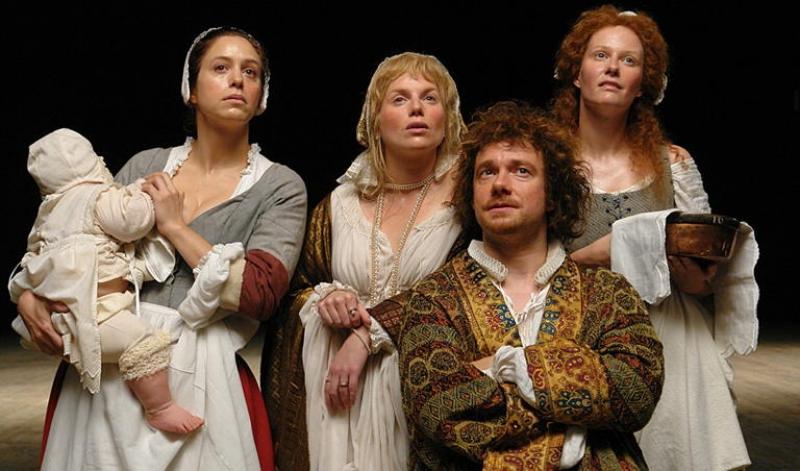Nightwatching | reviews, news & interviews
Nightwatching
Nightwatching
Convoluted conspiracy theories surround Rembrandt in Peter Greenaway's new film

How might a portraitist, working in oils, describe Martin Freeman's face? If one were a novelist, heavy with description, perhaps the following: fleshy, boneless features; pasty Northern European pallor; flesh the texture of sweaty suet pudding. Not, then, conventionally handsome, but still, we have those plaintive, expressive eyes and that rumpled yet quietly dignified presence.
And it's also a face that is uncannily perfect for Rembrandt van Rijn, for Freeman looks remarkably like the artist's self-portraits aged about 30. And, really, it's not just the lighting and makeup - as far as one can tell, no nose prosthetics were worn during the making of this film. What's more, with the clever, low-key lighting and its rich brown tonalities, the film looks - as you might expect from a sumptuous Peter Greenaway production - very much like a Rembrandt painting come to life. This makes it at least visually impressive, though the plot might give you a bit of a headache. Nightwatching presents a highly speculative tale involving the Dutch artist in a confusingly convoluted conspiracy centred on the painting of his 1642 masterpiece, The Night Watch (pictured right). The painting depicts a group portrait of the Amsterdam Musketeer Militia, from which various shady characters are bought to life in the film. Upon discovering that Rembrandt has painted a number of clues in the work that point the finger at crimes perpetrated by some of the sitters, including murder, incest and rape, the sitters plot their revenge. They beat him up, attempt to blind him and set about ruining his reputation, resulting in his loss of commissions and much of his fortune. (Note, though it is true that Rembrandt experienced financial hardship after painting The Night Watch, the image of him living as a pauper is greatly exaggerated - probably for romantic effect - and much of what Greenaway suggests must, of course, be taken with a large pinch of salt.)
Nightwatching presents a highly speculative tale involving the Dutch artist in a confusingly convoluted conspiracy centred on the painting of his 1642 masterpiece, The Night Watch (pictured right). The painting depicts a group portrait of the Amsterdam Musketeer Militia, from which various shady characters are bought to life in the film. Upon discovering that Rembrandt has painted a number of clues in the work that point the finger at crimes perpetrated by some of the sitters, including murder, incest and rape, the sitters plot their revenge. They beat him up, attempt to blind him and set about ruining his reputation, resulting in his loss of commissions and much of his fortune. (Note, though it is true that Rembrandt experienced financial hardship after painting The Night Watch, the image of him living as a pauper is greatly exaggerated - probably for romantic effect - and much of what Greenaway suggests must, of course, be taken with a large pinch of salt.)
Though the plot might read like an edge-of-the-seat thriller, the film is unevenly paced and suffers from more than the odd longueur. This is especially so in portentous scenes involving a whey-faced character called the Angel of Birth, who keeps venturing onto Rembrandt's rooftop, arms spilling with nursing babies. Some of these scenes could have been happily snipped. The film also contains quite a bit of energetic sex and nudity, though this is a rather nice diversion from the frenzied intrigue and machinations of the plot.
But though, more compellingly, we gain some insight (however loosely portrayed) into Rembrandt's relationships with the three women in his life, we gain almost nothing of his life as an artist. The execution of the great painting is undertaken strictly off-stage, and for the most part you'd hardly know that Rembrandt was much of an artist: he's never seen to wield a brush. This may be a good thing since, on the whole, scenes in artist bio-pics depicting intense acts of creative genius are mildly risible.
Freeman is convincing in the role, tender in scenes with young wife Saskia (Eva Birthistle), with whom he spars playfully, and with whom he also presents intimate pieces to camera - here the dialogue sparkles - and prickly, sweary and pugnacious in scenes involving his detractors. Despite the film's lengthy, and often tedious, convolutions, Freeman's face provides a thoroughly watchable canvas.
Watch the trailer for Nightwatching below
The future of Arts Journalism
You can stop theartsdesk.com closing!
We urgently need financing to survive. Our fundraising drive has thus far raised £49,000 but we need to reach £100,000 or we will be forced to close. Please contribute here: https://gofund.me/c3f6033d
And if you can forward this information to anyone who might assist, we’d be grateful.

Subscribe to theartsdesk.com
Thank you for continuing to read our work on theartsdesk.com. For unlimited access to every article in its entirety, including our archive of more than 15,000 pieces, we're asking for £5 per month or £40 per year. We feel it's a very good deal, and hope you do too.
To take a subscription now simply click here.
And if you're looking for that extra gift for a friend or family member, why not treat them to a theartsdesk.com gift subscription?

Add comment